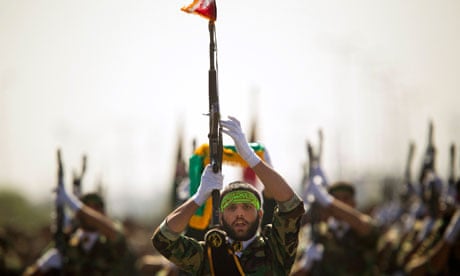Ian Black: on the Middle EastIraq
This article is more than 12 years old
Ian BlackMiddle East editor
Thirty years ago this week Saddam Hussein launched a 'whirlwind war' that lasted eight years
 Members of Iran's Basij militia march during a parade to commemorate the 30th anniversary of the Iran-Iraq war. Photograph: Morteza Nikoubazl/Reuters
Members of Iran's Basij militia march during a parade to commemorate the 30th anniversary of the Iran-Iraq war. Photograph: Morteza Nikoubazl/ReutersThu 23 Sep 2010
Nostalgia is not the right word to describe how Iranians and Iraqis feel when they look back at the epic war they fought – one of the longest and bloodiest of the 20th century.
It began 30 years ago this week when Saddam Hussein launched what he hoped would be an easy victory over a disorganised enemy. By its end, nearly eight years later, more than 1 million people were dead and both countries deeply scarred. It has marked the politics of the Middle East ever since.
Commemorative concerts, photographic exhibitions and military parades bristling with missiles are being held across Iran, where the conflict is always referred to in Persian as the "sacred defence" or "the imposed war". Events were launched, symbolically, at Ayatollah Khomeini's mausoleum in Tehran.
Yet remembrance is not a regime monopoly. Mir Hossein Mousavi, the Green opposition leader who claimed victory in last year's disputed presidential elections, was prime minister throughout the war and refers – as do almost all official speeches on a national theme – to the blood of martyrs who are forever exalted. Endless battlefield images – young volunteers to the Basij militia charging across minefields, soldiers praying in muddy dugouts in an eastern version of Flanders fields – are shown on state TV.
In Iraq, where the war is associated with the darkest days of the Ba'athist regime, there are no celebrations. Five years ago the new government apologised to Iran for starting what was called at first "the whirlwind war" but soon became known officially as Qadisiyyat Saddam, a deliberately emotive reference to the famous Arab victory over the Persians in the seventh century.
Border clashes took place sporadically early in 1980 and, with Iran's armed forces weakened by purges, Saddam hoped to replace the deposed shah as regional strongman. He was alarmed, too, by the radicalising effect of the Islamic revolution on Iraq's restive Shia majority and wanted to improve access to the Gulf through the Shatt al-Arab.
Over time he enjoyed the discreet support of the west, with the US providing satellite intelligence on Iranian deployments and European countries supplying armaments and raw materials for gas and chemical weapons. Iran's continuing suspicions of America and Europe cannot be understood without remembering that grim period. Washington wanted both countries to bleed, but it feared Iran more.
Saddam began by attacking the oil-producing province of Khuzestan and captured Khorramshahr a month after fighting began. But it was, one historian has written, "a catastrophic miscalculation". Nor did he secure the mantle of Arab leadership he aspired to, even though the Saudis and the Gulf states bankrolled the war effort.
Iran, with a population of 50 million to Iraq's 17 million, mobilised to defend the revolution. By the summer of 1982 Iraq was on the defensive and remained so until the end in August 1988. The death toll, overall, was an estimated 1 million for Iran and 250,000-500,000 for Iraq.
In the west it often seemed, even at the time, like a forgotten war. Far more attention has been paid to later conflicts: Iraq's invasion of Kuwait in 1990 and the US-led invasion and occupation of 2003 which overthrew Saddam and changed the political map of the region.
But for those directly involved, memories of the Iran-Iraq war can still be raw and painful. Participants in a remarkable pair of interactive programmes broadcast by the BBC's Arabic and Persian services told terrible stories. Umm Muhammad wept quietly as she remembered loved ones who had died. Ubay, from Mosul, born in 1980, described growing up without his father, a prisoner of war in Iran for 20 years. Shapour, an Iranian living in Britain, provided a stark reminder of what geopolitics and grand strategy can mean for ordinary people. "Nobody wins wars," he said. "Everyone loses."
Naji, an Iraqi conscript, was blown up twice in the tank he drove. "You got used to it. People were being killed every day," he said. Bahman, an Iranian from Ahwaz on the southern front, was injured in a gas attack and still suffers the effects, as do thousands of other Iranians. Muhmmamad, a thirtysomething Iraqi, said: "I and my generation began our lives in war. And we are still at war."
New research is helping produce a fuller picture of the conflict, using once unthinkable access to official documents from the Saddam era. Analysis of them, says the academic Ibrahim al-Marashi (whose work was plagiarised by the British government for its 2003 "dodgy dossier" on Iraqi WMD), "can rewrite the history of large segments of Qadisiyyat Saddam".
A conference this week at the London School of Economics is looking, among other questions, at the motivation of the Basij, the role of oil, regional influences and the strategy of the US. It's a sure sign that one of the landmark events of the Middle East in the 20th century is starting to pass from memory into history.
No comments:
Post a Comment